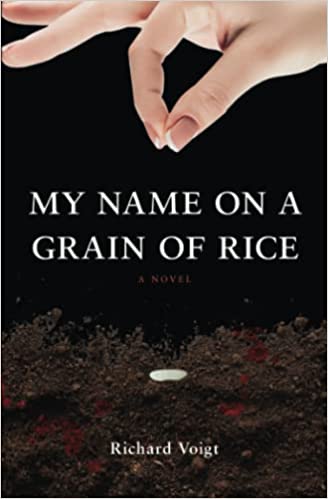My Name on a Grain of Rice by Richard Voigt
It’s a bold and gutsy move to open a book with a description of two dead men, their bodies mangled at the bottom of a construction pit, blood running from their mouths and stiffening into maroon jelly.
“If you have to, blame me for wanting to feel the rush that comes from making something out of nothing, and that something would be me,” confesses the narrator, Harry Travers. “Other than the fact that ultimately I caused men to die, I’m as ordinary as they come.”
My Name on a Grain of Rice (Atmosphere Press) by Richard Voigt is the story of a young man’s journey to know himself and justify his existence. The title is a metaphor for living small (writing in tiny letters on rice is an art) vs. having your name in neon lights.
Harry is an unhappy computer-jock at a software startup with a swanky, cutthroat boss. Without a plan for his future, Harry lets his coworker, Sterling Nesko, talk him into quitting with him. “According to Sterling, if you are going to do anything important in life, you must have illusions, not dreams…the trick was to convince yourself that you could do it. Believe your own bullshit.”
A YOUNG MAN’S JOURNEY
It doesn’t take long for Harry to realize that his decision to quit may have been “rushed” and “inept.” When Sterling announces over a beer, “I’ve signed us up to be pile driver apprentices,” Harry puts up a weak defense but acquiesces. “I had nothing else going for me,” he admits.
Pile drivers use heavy equipment to drive support beams into bedrock in preparation for building heavy structures. It’s a “3-D” job: difficult, dangerous and dirty, but it’s also a chance for Harry to reject his father’s hedge-fund trader lifestyle, complete with country club aspirations and a fake chateau home built for investment purposes.
Voigt paints a very believable picture of the Harry and Sterling’s 20-something reality: towels too smelly to use, sinks slowing turning into swamps, an apartment with no furniture, only piles of things. Harry soon tires of drunken evenings in the local bar, while Sterling often reports to work hungover.
The interactions of the two “punks” (as pile driver apprentices are called) with their seasoned crew is classic male workplace drama and intrigue. With gritty detail, it’s a story of men and their relationships with co-workers, fathers, women, money and danger reminiscent of some meatier television dramas like Chicago Fire or Rescue Me.
Harry’s and Sterling’s work crew is a rough bunch, some missing fingers, some missing teeth, men born nasty or knocked around as kids, men with Bibles in their lockers. But gradually the crew (with one notable, deadly exception) accepts the new guys, because everybody’s safety depends on trust.
A “BRISK AND WELL-WRITTEN NOVEL”
“Ours was the brute — and eventually invisible — work of construction,” says Harry. When the structure was finished, “no one would be able to see the piles and support steel; it would be buried.”
As Harry and Sterling gain more experience, their team’s luck begins to be run out. A tricky underground job is made even more dangerous by the construction company’s lack of concern for worker safety.
No coming-of-age story is complete without romance, and wives and girlfriends add dimension to the book’s mix of characters and events. It’s love at first sight when Harry glimpses Minnie, sister of Harry’s disapproving co-worker. Sterling finds Crystal irresistible, even after she stiffs him for drinks at the bar.
My Name on a Grain of Rice is a “brisk and well-written novel dealing in reality and relationships,” says the Independent Book Review. Voigt has tied his experience as a litigating attorney focusing on workplace issues to his insight into humanity, and skillfully blends them into a moving story that gets to the heart of what it means to be a man.
About Richard Voigt:
Richard Voigt was born in Oskaloosa, Iowa. He is a graduate of Wesleyan University and the University of Virginia Law School. After working in the Solicitor’s Office in the U.S. Department of Labor, Washington, D.C., he entered private practice as a litigating attorney focusing on issues of the workplace. He was selected for inclusion in Best Lawyers in America. Following his retirement from the practice of law, he has worked in the Academic Support Center at Manchester Community College in Manchester, Connecticut and hopes to return to that role post-COVID. He currently is a lecturer at Wesleyan University’s Institute for Life Long Learning and the Presidents’ College at the University of Hartford. He and his wife Annemarie have two grown sons and live in Connecticut.





